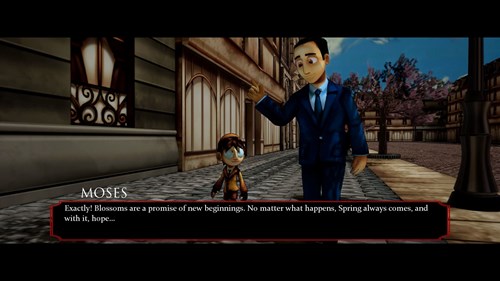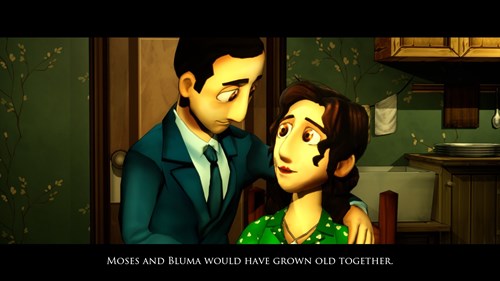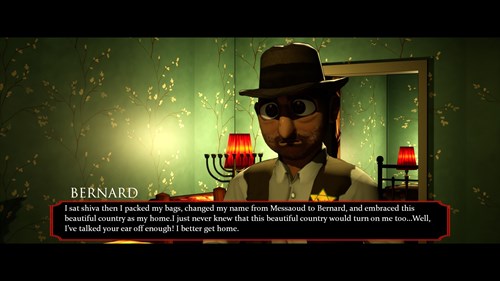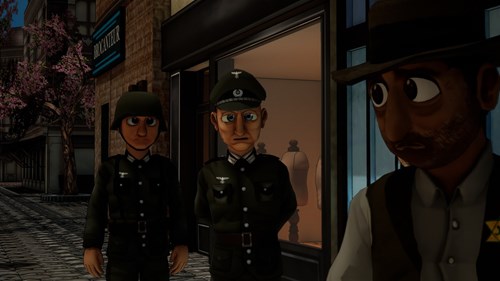By using this website, you agree to our Privacy Policy and use of cookies and similar technologies. We store cookies and similar technologies on your computer or device to provide you with a great experience and help our website run effectively.
Why I Made It: Luc Bernard, Director of The Light in the Darkness

Why I Made It: Luc Bernard, Director of The Light in the Darkness, on what the groundbreaking videogame is about and why Holocaust education is important today.
The Light in the Darkness forces you to consider the terrifying emotional truth of this dark chapter in history... it’s hard to think of another game that has really dug into the horrors and the trauma of the war like this.
- Rob Leane, gaming editor at RadioTimes.com
The original intent for The Light in the Darkness was to tell the Holocaust through a videogame so that the current generation could know about what happened. But since its release, it has changed the pop culture landscape in terms of how videogames are now being perceived by the mainstream press, something I certainly did not anticipate.

Most videogames about World War 2 put you in the shoes of members of the Army, and never mention the Holocaust. Rarely are there ever any Jewish protagonists. The Light in the Darkness is one of the first games that actually puts you in the shoes of Jewish people during that period of history.
Often in Holocaust education, the people who died are only referred to as numbers. There is a huge focus on survivors, but the stories of those who did not survive are seldom told. The entertainment industry relies on a happy ending to drive their stories, but that narrative is only accomplished by diverting the focus away from the people and lives that were lost.
I needed to change that with The Light in the Darkness.
Players spend an hour and half with these characters, forming their own relationships and growing attached to them. At the end of the game, when they do die in Auschwitz, I decided to showcase what their lives could have been if the Shoah had not happened.

That is really when it hits players of what the Holocaust did: whole families erased from history. I needed to put people first, not statistics or numbers. That’s why most players are in tears at the end.
Because I chose to put empathy and the human experience above all else, another fascinating outcome is that the players who have finished The Light in the Darkness have begun talking about modern human rights issues and racism. Unintentionally, it has become a tool for inciting empathy in a way that videogames have never done before. It’s a game about war that is trying to make the world more kind.
Internationally, the release of this game has had a lot of success. Many players in the Arabian Peninsula are, for the first time, learning about the Holocaust, and African refugees have reached out to me to say they see themselves in these characters. It demonstrates how as humans we have more in common than we think, and that stories are what connect us, no matter our ethnicity.

In popular culture and mainstream media, the full scale of the Holocaust is never shown. For example, it’s rare we hear about the different Jewish groups the Nazis went after, such as Sephardic Jews. Bernard, who’s name we learn later in the game is Messaoud, was from Algeria before he moved to France in search of a better life.
It’s estimated around 10,000 Sephardic Jews were killed during the Shoah in France.
Opening with the Évian Conference of 1938, which doomed Jewish refugees by refusing them entry to safe countries, the game follows a family of Polish Jews in Paris as they experience the Nazi occupation, leading, ultimately, to the Vel d’Hiv roundup in 1942. In the space of a moving hour, Bernard touches on the Nuremberg Laws, antisemitism in fairy tales, anti-Jewish propaganda and Zionism. He shows how the Holocaust was, pace Whoopi Goldberg, a “race-based” genocide and how quickly France went from embracing Jews to sending them to their deaths.

Showcasing a diverse and accurate depiction of the Holocaust in France was very important to me. The team who worked on the game is an incredibly diverse group, with Native American, Latino, Indian, Asian and Russian refugee contributors working on the production.
I am incredibly proud of how The Light in the Darkness has been received by the mainstream media and worldwide by so many different groups. I believe we have opened up the door for videogames to be taken as seriously as movies and books in regard to how we understand and digest serious historical topics.
Mr. Bernard’s approach could even be used to deepen people’s understanding of other genocides. The game arrives at an urgent moment. The Anti-Defamation League, an advocacy group, reports that anti-Semitism has reached a record-high in America. Elsewhere, memories of Nazi horrors are waning as elderly survivors die. By keeping their stories alive, the game helps to inform new generations about the atrocities that Jews were made to endure.
MoPOP is grateful to Luc Bernard for sharing his incredible perspective with us. The Light in the Darkness is available to play at MoPOP in the Indie Game Revolution exhibition. Get your tickets today!
Follow us on Instagram at @MoPOPSeattle to learn more about incredible games like The Light in the Darkness.
Want more pop culture news? Sign up to our newsletter and get content like this delivered straight to your inbox each month!